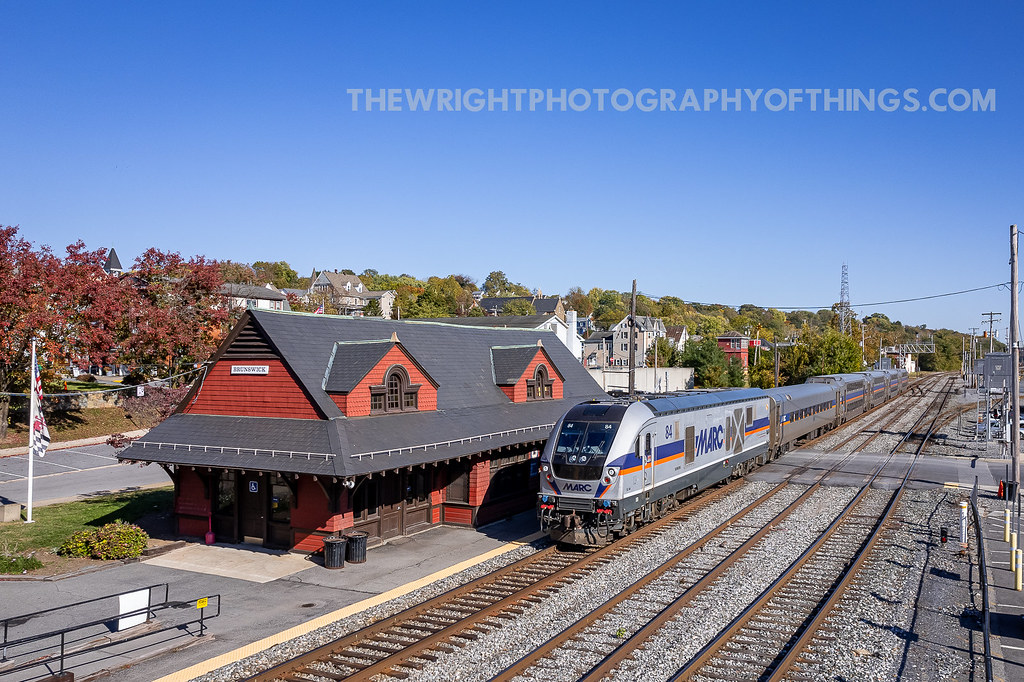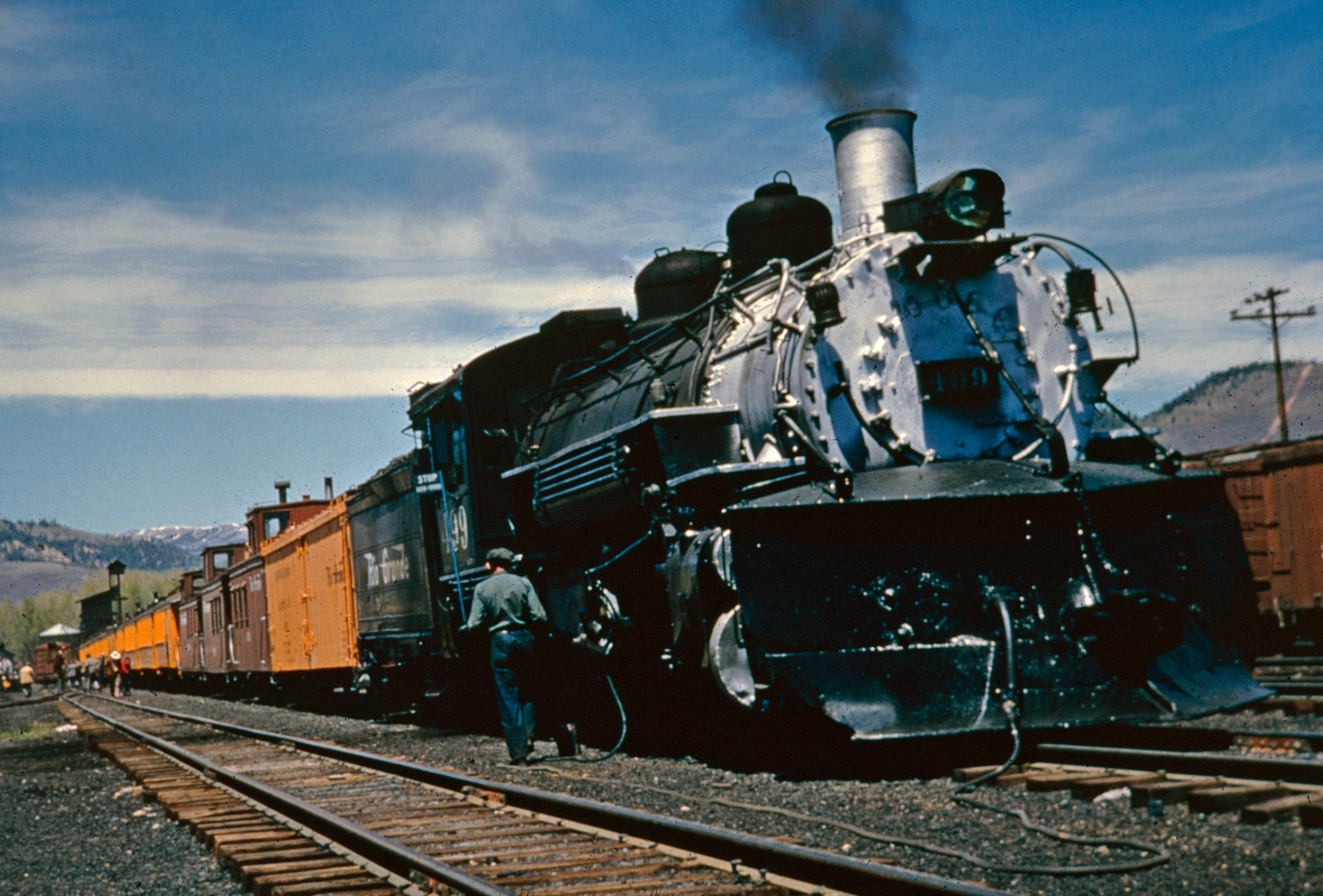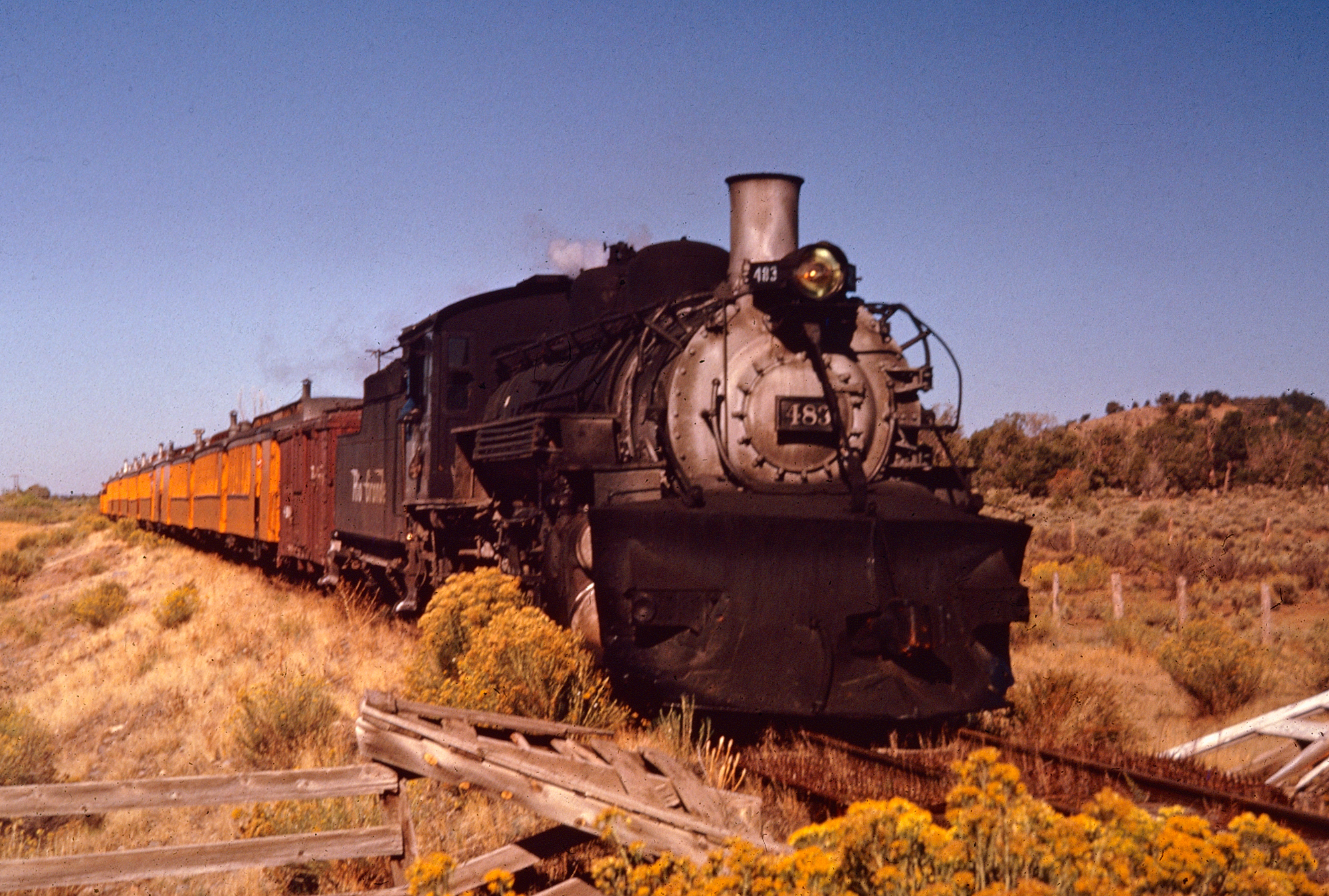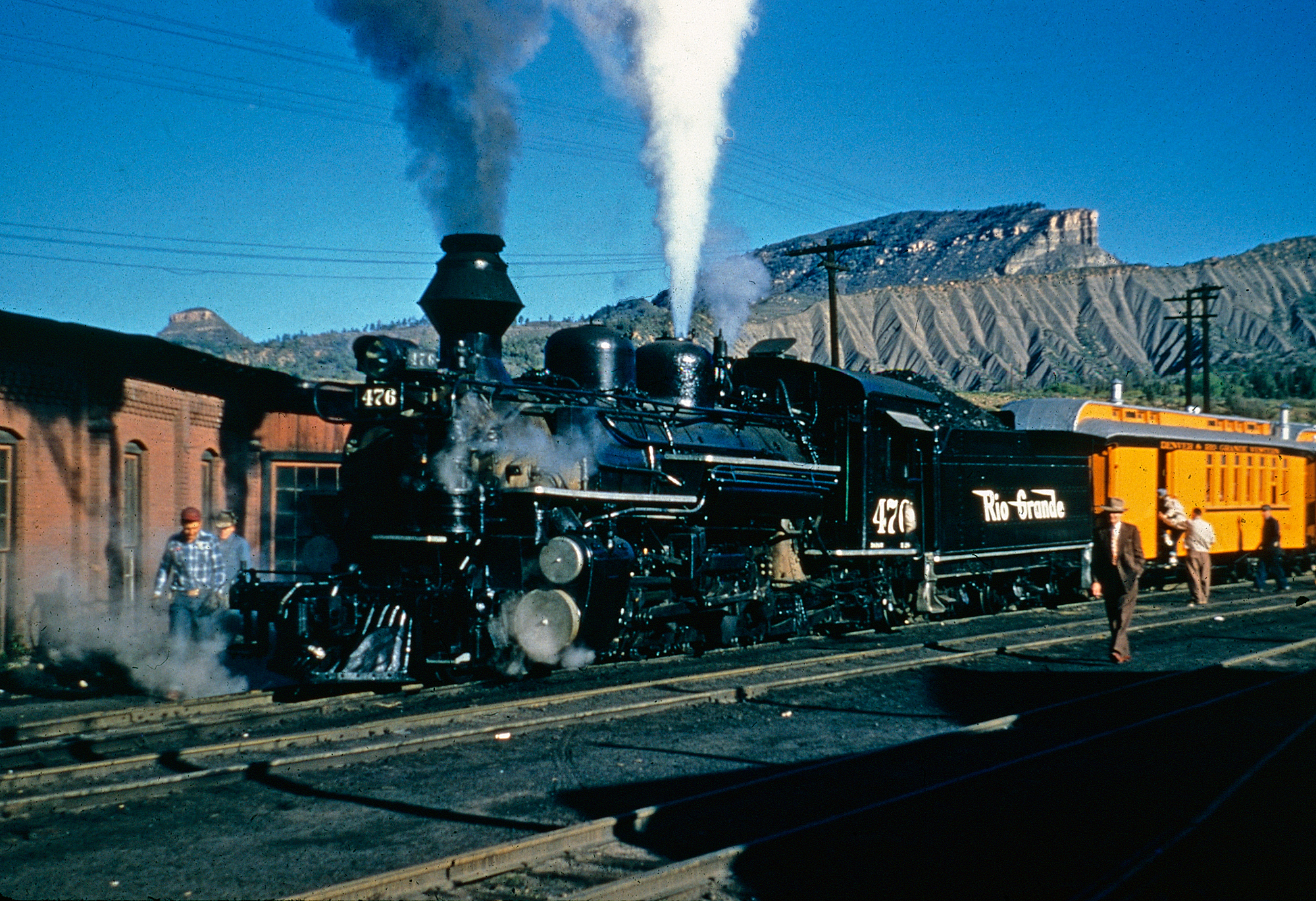Siemens SC-44 Locomotives: Specs, Data Sheet, Overview
Last revised: February 26, 2025
By: Adam Burns
The SC-44 is a diesel-electric passenger locomotive designed and manufactured by Siemens Mobility for the North American market. Introduced in March, 2014 - when a $225 million order was placed by the state DOTs of Illinois California, Michigan, Missouri and Washington for 32 locomotives - it is part of the builder's "Charger" line.
The SC-44 is compliant with EPA Tier 4 emissions standards, making it one of the cleanest high-speed passenger locomotives in operation.
It features a streamlined design, a 4,400 horsepower engine, and a top speed of 125 mph. As of this writing the SC-44 has been purchased by Altamont Corridor Express, Amtrak Midwest, California DOT, Coaster, MARC, and Washington DOT.
Photos
 MARC SC-44 #84 has outbound train P871 out of DC as it arrives at Brunswick, Maryland on October 21, 2022. Jon Wright photo.
MARC SC-44 #84 has outbound train P871 out of DC as it arrives at Brunswick, Maryland on October 21, 2022. Jon Wright photo.Overview
The SC-44, commonly known as the "Charger," is a contemporary locomotive manufactured by Siemens Mobility. While "Amtrak Midwest" - which consists of the 'Lincoln Service', Illinois Zephyr, Carl Sandburg, Illini, Saluki, Blue Water, Wolverine, Pere Marquette, the 'Hiawatha Service', and Missouri River Runner - does currently operate a fleet of 33 locomotives (purchased at a cost of $216.5 million) they are predominantly found operating for the state agencies previously mentioned.
Amtrak has relied on a 'Charger' variant, the ALC42, for its long-distance services. This locomotive has been generally reliable during its short time in service and will eventually replace General Electric's "Genesis" series acquired between 1992-2001.
First Unit
The first production SC-44 was unveiled on March 26, 2016 at Siemens' factory in Florin, California (Sacramento). The company's 60-acre rail manufacturing hub is renowned for housing the manufacturing process of cutting-edge, fuel-efficient locomotives like the 'Charger.'
Following extensive testing at the Transportation Technology Center (TTC) in Pueblo, Colorado, this advanced diesel-electric locomotive entered revenue service at various points throughout 2017.
Revenue Service
That year the locomotive entered revenue service at various locations; following testing on the Capitol Corridor and San Joaquins in Northern California on May 25, 2017 the first units began regular service on October 23rd; at "Amtrak Midwest" testing began in July with the first solo run occurring on the "Hiawatha Service" on August 24, 2017. This date is generally regarded as the locomotive's entry into revenue service.
Production
To date, a total of eight agencies known as state departments of transportation (DOTs) and rail operators, have adopted the SC-44 'Charger.' These organizations include "Amtrak Midwest," Illinois DOT, Brightline (SCB-40), MARC, Coaster, Washington State DOT, Caltrans, and Metro-North (SC-42DM), showcasing both regional and national reach of these efficient machines.
There have also been three Canadian systems to purchase viarants including Exo (Montreal), Ontario Northland, and VIA Rail.
The SC-44's production dates occurred between 2014 and 2020 (2022 in Canada), stemming from the unprecedented partnership among several U.S state agencies to collectively invest in the Next Generation Equipment Committee's (NGEC) railcar standardization initiatives.
The exact number of locomotives produced for each agency varies, with Amtrak receiving the bulk of the orders, a whopping 33 locomotives (along with 200 ALC-42/Es). Brightline welcomed 21 of the SCB-40s, while MARC received 8. Finally, Washington State and Caltrans received 10 and 31 units (Coaster and California DOT), respectively.
The SC-44 is powered by a 4,400 horsepower Cummins QSK95 diesel engine. This 16-cylinder powerhouse possesses a displacement of 95 liters along with a nominal rating of 4,400 horsepower. Renowned for its high-speed transient response, top-tier fuel efficiency, and extended service intervals, it's the epitome of advanced diesel engine technology.
The tractive effort stands at an impressive 71,000 pounds. In terms of dimensions, the locomotive stretches 71 feet and 6 inches in length, stands 14 feet and 8 13/32 inches tall, and spans 10 feet in width.
Specifications
With a weight of 280,000 lbs, a wheelbase of 40 feet and 9 19/32 inches, it's specially designed to travel at a maximum speed of 125 mph. Its electrical system is AC, bolstered by a Siemens-made static inverter.
The SC-44 entered service with IDOT and WSDOT on August 24, 2017. Following this, Brightline commenced operations in January, 2018 with its SCB-40s while Caltrans started utilizing the 'Chargers' in March 2020.
Siemens
The introduction of the 'Charger' locomotives signals a golden era for U.S passenger rail, driven by the SC-44’s unprecedented capacity to cater to the needs of modern travelers –from providing a sustainable alternative to avoid road congestion to enhancing regional mobility for all. Indeed, the SC-44 is a critical milestone in the journey towards a redefined U.S passenger rail technology future.
It has been interesting to witness Siemens rise in the U.S. and North American passenger locomotive market. The German manufacturer had produced high quality products in Europe for decades but in America had largely been relegated to producing only light rail vehicles (LRTs) for cities and larger towns.
As Railfan & Railroad Magazine notes, all of that changed on October 29, 2010 when Amtrak approved Siemens for a $466 million deal to build 70 ACS-64 electrics, or “City Sprinters,” for use on the Northeast Corridor.
To comply with the "Buy America Act," Siemens even constructed its own manufacturing plant in Florin, California to produce its locomotives.
What is known as Siemens Mobility is a subsidiary of Siemens AG, a German multinational conglomerate. It specializes in providing transport solutions for urban, intercity, and freight transportation.
The company offers a comprehensive range of products and services, including rolling stock, rail automation and electrification solutions, intelligent traffic systems, and related services. Siemens Mobility aims to enhance the passenger experience, improve operational efficiency, and ensure sustainable transportation.
The "City Sprinters" are impressive machines capable of producing as much as 8,600 horsepower. They are based from the Siemens' successful EuroSprinter series that are popular throughout Europe.
Following the ACS-64's success, the company has enjoyed equal success with its diesel-electric "Charger" series, which has been discussed within article. As of this article, Siemens has either produced or has on order a total of 387 'Charger' variants to Amtrak and the state agencies previously mentioned.
Recent Articles
-
Rio Grande 2-8-2 Locomotives (K-37): Specs, Roster, Photos
Apr 15, 25 12:57 PM
Rio Grande's Class K-37 Mikes were itsdge steamers to enter service in the late 1920s. Today, all but two survive. -
Rio Grande 2-8-2 Locomotives (K-36): Specs, Roster, Photos
Apr 15, 25 11:09 AM
The Rio Grande's K-36 2-8-2s were its last new Mikados purchased for narrow-gauge use. Today, all but one survives. -
Rio Grande 2-8-2 Locomotives (Class K-28): Specs, Roster, Photos
Apr 14, 25 10:24 PM
Rio Grande's Class K-28 Mikados were its newest narrow-gauge steam locomotives since the Mudhens of the early 1900s. Today, three survive.


